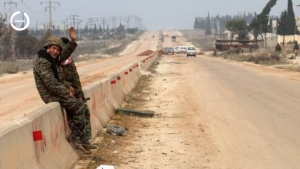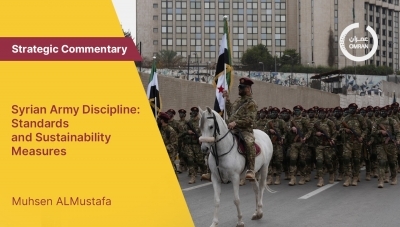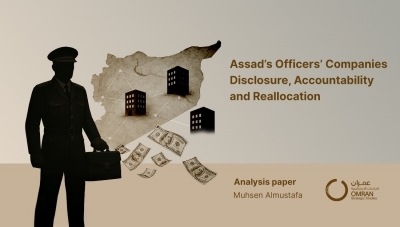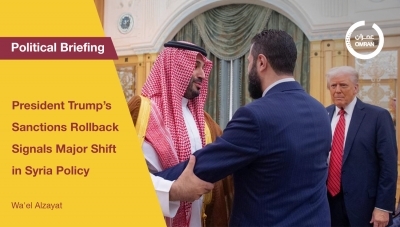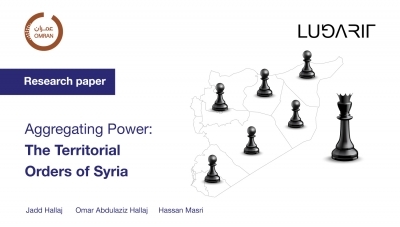Omran News
Monthly Briefing on the Events of the Syrian Scene March 2024
General Summary
This report provides an overview of the key events in Syria during the month of March 2024, focusing on political, security, and economic developments. It examines the developments at different levels.
- Politically, in its 13th year, the Syrian revolution is mired in political flux. Arab nations strive for reconciliation with Assad's regime, facing opposition from Western and the U.S. insistence on sanctions and normalization rejection. Amid these tensions, Assad's invitation by Bahrain to the Arab summit in May stands out. Concurrently, the push for the Syrian committee's ninth round of meetings by the international envoy is hampered by a location dispute between the regime and opposition.
- Security, the security environment in Syria, shadowed by the Gaza conflict, witnesses an upsurge in violence unprecedented since the halt of broader military operations. In Idlib, Russian airstrikes and regime artillery bombard rural and residential areas, escalating the use of suicide drones against civilians and military targets alike. Hay'at Tahrir al-Sham escalates its assault across Aleppo, Latakia, and Idlib. Meanwhile, the rise in ISIS activities in eastern Syria underscores the SDF's struggles against the group.
- Economically, despite a marginal uptick in the SYP's value, commodity prices soar, unaffected by the currency's stability. A landmark development is Iran's central bank's agreement to establish a joint Syrian-Iranian bank, marking a significant step towards deepening Iranian economic influence in Syria.
Decade Plus Three: Syrian Revolution and the Quest for Resolution
As the Syrian Revolution enters its 13th year, it continues to be marked by some Arab countries' attempts at rapprochement with the Assad regime, contrasted by Western countries' resistance to normalization and the ongoing lack of a viable political resolution. A united stance from the United States, Britain, France, and Germany has been articulated, showing firm opposition to normalizing relations with Assad's regime. They stress the importance of upholding sanctions and the need for a political settlement before beginning reconstruction efforts. Regionally, Bashar al-Assad's invitation to the upcoming Arab summit in Manama, Bahrain, on May 16, along with Faisal Mekdad (the regime's Foreign Minister) meeting his counterparts from Egypt, Lebanon, the United Arab Emirates, and Tunisia, indicates a shift towards nuanced Arab engagement.
Despite Assad's readmission into the Arab League at the 2023 Jeddah summit and the reestablishment of diplomatic relations with several Arab states, notably Saudi Arabia, there seems to be minimal readiness on his part to make meaningful concessions that would promote a political settlement or address security issues stemming from Syrian territory.
On the other hand, the Opposition's Syrian Negotiations Commission (SNC) has accepted an invitation from the UN special envoy to Syria, Geir Pedersen, to reengage in the Constitutional Committee's discussions. Despite agreeing to partake in the committee's 9th round next April, disputes over the meeting's venue persist, highlighting the deep-rooted divisions that complicate progress.
In Northwestern Syria, in Idlib, there has been an upsurge in public protests and civil demonstrations against Hay'at Tahrir al-Sham (HTS), with demands for improvements in security, administration, and services, as well as the release of detainees. These protests have been partly triggered by a series of arrests for alleged collusion within the ranks of HTS, including the death of a detainee due to torture. In an effort to address the unrest and bolster its internal legitimacy, the group has implemented several measures, including the declaration of a general amnesty and the introduction of structural reforms aimed at pacifying public dissent.
In Northeastern Syria, the Autonomous Administration of North and East Syria (AANES) has begun preparations for local elections, aiming to strengthen its legitimacy. The ratification of the High Electoral Commission law by the Syrian Democratic Council is a pivotal move toward affirming the administration's role as a legitimate authority over the region's population. However, the integrity of these elections hinges on the establishment of a system for independent and impartial monitoring and judiciary, an infrastructure the administration does not currently possess. Moreover, the decision of numerous political groups to boycott the elections, refusing to acknowledge the ANNES’s authority, suggests that the forthcoming elections may serve more as a symbolic gesture than a meaningful democratic process. This strategy seems to be an effort by the administration to divert attention from security and political dilemmas, alongside public calls for significant organizational reform. The pressing need for reform is underscored by increasing concerns over corruption, nepotism, and ideological control within its bodies, coupled with persistent appeals for the administration to distance itself from the PKK.
Gaza War Echoes: Rising Security Challenges and Internal Conflict
The ongoing conflict in Gaza is influencing Syria's security dynamics, with Israel launching strikes against Iranian forces and their allied militias. These strikes have included targets such as IRGC Military Advisor Riza Zirae in Baniyas, Tartus. The strikes have also hit several sites controlled by Hezbollah, including ammunition depots near Yabroud, Damascus, close to the Lebanese border. Moreover, Israeli operations have been concentrated in the south, particularly in Daraa and al-Quneitra, areas known for the activity of Iranian-backed militias. For a detailed overview of Israeli airstrikes in Syria since the beginning of 2024, please see Map (1).
![]()
Map (1): Map (1): Israeli Airstrikes Targeting Areas with Significant Iranian and Allied Presence & Influence – January 1, 2024, to April 1, 2024
Simultaneously, US airstrikes continue to target Iranian-backed militias in Deir Ezzor and the surrounding regions, resulting in injuries to individuals such as Haj Askar, a commander in the Iranian Revolutionary Guard. These persistent attacks highlight how Syrian territory is being used by regional and international powers to settle disputes and compete for influence. This dynamic is likely to further destabilize the already precarious security situation in Syria amid this power struggle.
Southern Syria is embroiled in a state of security turmoil and targeted violence, with Daraa particularly affected by the assassination of regime officers and security personnel via IED’s and shootings. The region has also experienced civilian deaths due to attacks by unidentified gunmen, underscoring the prevailing lawlessness. Efforts by local forces to target groups suspected of ISIS affiliations and individuals engaged in drug trafficking have been reported, including the notable killing of Shaker al-Shuwaier in Salkhad. The resurgence of drone technology for assassination purposes adds a layer of complexity to the already challenging security situation in southern Syria. These incidents of violence are part of a larger narrative involving ongoing reconciliations and the interaction between various local entities, such as regime forces, factions involved in settlements, and criminal organizations.
In Northwest Syria, Hay'at Tahrir al-Sham (HTS) has intensified its military actions against regime forces, resulting in both casualties and equipment losses. This increase in hostilities occurs alongside escalated Russian and regime airstrikes in the region, leading to a spike in violence. This includes the deployment of suicide drones by the regime, targeting both military and civilian objectives.
Eastern Syria has witnessed a surge in attacks by ISIS cells, challenging the Syrian Democratic Forces' (SDF) strategy to counteract them. In response, the SDF has executed targeted security operations to mitigate this threat. Notably, a recent operation by the Asayish forces against ISIS cells in al-Hasakah led to multiple arrests. Moreover, disturbances within SDF-administered prisons in al-Raqqa, including riots that resulted in casualties, signal underlying issues of discontent, and demands for improved treatment of detainees, particularly those linked to ISIS.
Inflation Outpaces Syrian Pound's Exchange Rate Improvement
In the Regime held-areas, the Syrian Pound (SYP) saw a modest increase in value against foreign currencies in March, driven by a combination of factors:
- A significant 50% rise in foreign remittances during Ramadan alleviated some of the pressure on the currency.
- A reduction in foreign trade activity led to a decreased demand for dollars.
- The demand for the SYP increased as individuals sold foreign currency to manage Ramadan expenses.
- The regime's government lowered the exchange rate for remittances by 100 liras, aiming to bridge the gap between the official and black-market rates and promote the use of formal channels for foreign currency inflows.
These factors collectively led to a temporary strengthening of the Syrian Pound. However, it's important to understand that this improvement is temporary and not due to monetary policy adjustments by the regime's Central Bank or improvements in production and foreign exchange reserves. The value of the lira is anticipated to fall after Ramadan.
Despite the lira's improved exchange rate, the cost of essential goods and materials continued to rise, with price increases exceeding 100% compared to the previous Ramadan. This indicates that the purchasing power of the population remains significantly compromised, largely due to the regime's policies, such as repeated increases in energy prices, prompting traders to guard against these hikes. Additionally, the regime continued to export vital crops and agricultural products, including staples like potatoes, garlic, and onions, despite domestic demand. The regime has decided to permit the export of various agricultural products, regardless of destination.
Iran is further expanding its influence within the Syrian economy, with the Central Bank of Iran authorizing the establishment of a joint Syrian-Iranian bank. This new bank is expected to facilitate financial transactions and enhance trade between the two countries. This move is in line with amendments to the Syria-Iran free trade agreement, which reduced customs duties on traded goods from 4% to 0%, likely increasing the presence of Iranian products in the Syrian market.
In the Opposition held-areas, the Salvation Government (SSG) in Idlib has eliminated certain fees for residential construction to ease recent protests against HTS. The SSG's Health Ministry also introduced regulations for the health sector, requiring licenses for pharmacies and medical supply stores.
In the countryside of Aleppo, basic commodity sales have plummeted by 50% due to skyrocketing prices and reduced purchasing power, in stark contrast to the previous Ramadan. Notably, meat and vegetable prices have surged, with meat prices increasing as regional traders buy up large quantities of sheep for smuggling. Additionally, investors have begun a project to build an earthquake-resistant residential city near al-Ra'i, which will include /1,500/ apartments.
In the SDF held-areas, the AANES has halted the export of sheep and cattle in response to a rise in local meat prices. Furthermore, fuel prices have skyrocketed by 170% without any formal announcement from AANES officials. Bread prices have also doubled, and vehicle registration fees have been adjusted to reflect the vehicle's year of manufacture, placing additional financial strains on residents, and diminishing their quality of life.

